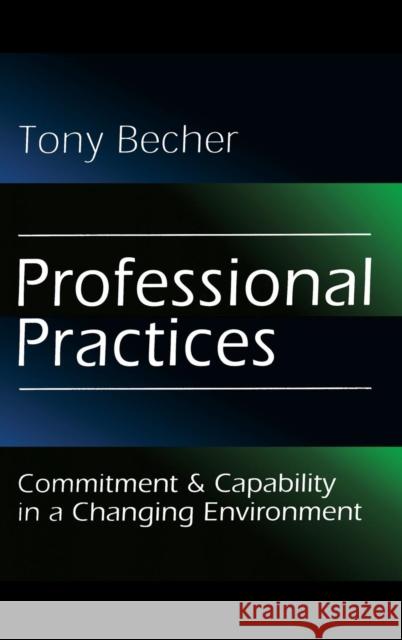Professional Practices: Commitment and Capability in a Changing Environment » książka
Professional Practices: Commitment and Capability in a Changing Environment
ISBN-13: 9781560004141 / Angielski / Twarda / 1999 / 296 str.
Professional Practices: Commitment and Capability in a Changing Environment
ISBN-13: 9781560004141 / Angielski / Twarda / 1999 / 296 str.
(netto: 676,35 VAT: 5%)
Najniższa cena z 30 dni: 654,86
ok. 16-18 dni roboczych.
Darmowa dostawa!
There is recurrent public concern with enhancing the quality of professional performance. What is the con-temporary understanding of professionalism? Are the needs of professionals in various fields being met in today's world, as what is commonly called "continuing professional development" has become of a sizable industry? Many books treat the professions as a homo-geneous group and view them from an external stand-point. In Professional Practices Tony Becher investigates the differences as well as the similarities between and within professional groupings, and presents the perspec-tives of insiders. One particular theme concerns the main patterns of change in professional careers and the spe-cific problems faced by women professionals in a largely male-dominated environment.Brilliantly written, the book focuses on six professions-medicine, pharmacy, law, accountancy, architecture, andslructural engineering. The material is based on 190 interviews with a variety of members of the six professions. Becher's book offers original and sensitive insight into the working Ives of practitioners and an understanding of the ideas and values they embrace. He a'gjes that their high sense of commitment stems from a concern to enhance their individual reputations and to maintain their collective professional status. Becher highlights re variety of activities in which these professionals are engaged and the reasons for their reponses to social and political pressures from outside their fields. Above all, he seeks to demystify professionalism and to show that professional people share with others a wide range of universal human feelings and concerns. A postscript raises the issue of why -Diversities are little involved with continuing education in the professions.Practicing professionals will benefit from this insight into how people in their own and other professions cope with similar problems. Becher's volume will be particularly ap-pealing to educationists, policymakers, and social scientists interested in the subject of professionalism, those involved in the provision of initial and mid-career change for the orofessions, and those with a lay interest in the topic.











